| M (continued) |
|
Title Screen
|
Movie Title/Year and Scene Descriptions |
Screenshots
|
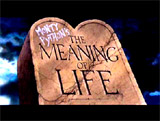
|
Monty Python's The Meaning
of Life (1983, UK)
- the various skits about the 'meaning of life -
and death,' including the fantastic short film The Crimson
Permanent Assurance (1983) preceding the movie
- the sequence in a fish aquarium of human-headed
fish who exchanged pleasantries, commented upon one of their
own kind being served in a restaurant, and wondered about life:
(-
"Hey, look. Howard's being eaten" - "Is he? Makes
you think, doesn't it?" - "I mean, what's it all about?" - "Beats
me")
- the hospital birth scene when the doctors were
fascinated with "the machine that goes ping" ("that
means your baby is still alive") and basically neglected
the patient Mrs. Moore (Valerie Whittington); the obstetrician
(Graham Chapman) and Dr. Spencer (John Cleese) treated the newborn
roughly in the Fetus Frightening Room ("Here it comes. And
frighten it!"), used "rough towels" and then ordered: "Show
it to the mother. That's enough...Sedate her. Number the child.
Measure it, blood type it, and isolate it!"); when the mother
simply asked: "Is it a boy or girl?", the obstetrician
replied: ("Now, I think it's a little early to start imposing
roles on it, don't you? Now, a word of advice. You may find that
you suffer for some time a totally irrational feeling of depression:
'PND', as we doctors call it. So, it's lots of happy pills for
you, and you can find out all about the birth when you get home.
It's available on Betamax, VHS, and Super Eight")
- the
"Every Sperm is Sacred" musical song lyrics, a lavish
production number sung in part by a pregnant Mum (Terry Jones)
with her many children: ("Hindu, Taoist, Mormon, Spill theirs
just anywhere; But God loves those who treat - their semen with
more care; (chorus) Every sperm is sacred. Every sperm is great.
If a sperm is wasted, God gets quite irate")
- the sequence of Protestant Mr. Harry Blackitt
(Graham Chapman), speaking to his wife (Eric Idle) - criticizing
the neighboring poverty-stricken Catholics with too many children
who didn't practice birth control: ("Look at them, bloody
Catholics, filling the bloody world up with bloody people they
can't afford to bloody feed...every time they have sexual intercourse,
they have to have a baby"); his statement that Protestants
could take precautions ("by wearing a rubber sheath over
my old feller, I could insure that, when I came off, you would
not be impregnated....That's what being a Protestant's all about.
That's why it's the church for me...and, Protestantism doesn't
stop at the simple condom! Oh, no! I can wear French Ticklers
if I want...French Ticklers. Black Mambos. Crocodile Ribs. Sheaths
that are designed not only to protect, but also to enhance the
stimulation of sexual congress")
- the scene of the class in which sex education
and proper foreplay was taught by Prof. Humphrey Williams (John
Cleese) to a bored class of students: ("Nibbling the earlobe,
uhh, kneading the buttocks, and so on and so forth. So, we have
all these possibilities before we stampede towards the clitoris,
Watson"), and then to demonstrate, he introduced his wife
Helen in front of the class and opened up a drop-down Murphy
bed; after the two disrobed, they proceeded to make love: ("Now,
all these forms of stimulation can now take place ... and, of
course, tonguing will give you the best idea of how the juices
are coming along. Helen! Now, penetration and coitus -- that
is to say, intercourse up to, and including, orgasm...so, the
man starts by entering -- or mounting -- his good lady wife in
the standard way. Uh, the penis is now, as you will observe,
more or less, fully erect...the man now starts making thrusting
movements with his pelvic area, moving the penis up and down
inside the vagina, so...while the wife maximizes her clitoral
stimulation by the shaft of the penis by pushing forward")
- the battlefield scene when Blackitt (Eric Idle)
and fellow soldiers offered a goodbye present to ungrateful Capt.
Biggs (Terry Jones) - he received two clocks and a watch by accident,
a check, and a cake: ("There's love in that cake...It's
too good a cake not to eat! Get the plates and knives"),
as the men around him were shot down
- the sequence of a General (Graham Chapman) pontificating
about the need for an Army before being struck down by the hand
of God, and Sgt. Major's (Michael Palin) question posed to his
troops about the need to drill and march: ("Now, today,
we're going to do marching up and down the square! That is, unless
any of you got anything better to do. Well?! Anyone got anything
they'd rather be doing than marchin' up and down the square?!")
- and one by one, his troop members deserted him with their requests
to be home with the wife and kids, reading a book, learning the
piano, and going to the "pictures"
- the strange interlude mid-way through the film
- "Find the Fish" with three characters: a drag queen
(Graham Chapman), a gangly long-armed man (Terry Jones), and
an elephant-headed butler - ("Where can that fish be?...It
is a most elusive fish...Oh, fishy, fishy, fishy, fish")
|
"Find the Fish"
|
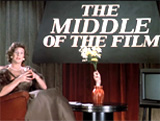
|
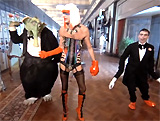
|
- the gory "Live Organ Transplants" sequence
when two National Health doctors contractually claimed that they
could remove a healthy liver from a still-living donor, and proceeded
to operate on live patient - card-carrying organ donor Mr. Brown
(Terry Gilliam)
- the great "Galaxy Song" sung by Mr.
Pink (Eric Idle), stressing the place of Man in the universe:
("So remember, when you're feeling very small and insecure
/ How amazingly unlikely is your birth / And pray that there's
intelligent life somewhere up in space / 'Cause there's bugger
all down here on Earth") while featuring an animated constellation
of stars resembling a pregnant woman giving birth to represent
the "expanding universe"
- the controversial "Penis Song" in Part
VI: The Autumn Years - performed with a piano by Noel Coward
(Eric Idle) in front of restaurant diners: ("Isn't it awfully
nice to have a penis? Isn't it frightfully good to have a dong?
It's swell to have a stiffy. It's divine to own a dick, From
the tiniest little tadger To the world's biggest prick. So, three
cheers for your Willy or John Thomas. Hooray for your one-eyed
trouser snake, Your piece of pork, your wife's best friend, Your
Percy, or your cock. You can wrap it up in ribbons. You can slip
it in your sock, But don't take it out in public, Or they will
stick you in the dock, And you won't come back")
- the oft-remembered scene in the fancy French
restaurant of the gruesome, slovenly, massively overweight, constantly-vomiting
(into a bucket) character of Mr. Creosote (Terry Jones), culminating
in his explosion from overeating a rich, 700 course meal after
he swallowed a thin mint offered by a determined maître
d' (John Cleese): ("Finally, monsieur, a wafer thin mint...It's
only a tiny little thin one...Just, just one. Bon appetit");
the customer's fat-coated, still-beating heart was revealed when
other diners were showered with his insides and half-digested
food after his stomach spectacularly burst; the maitre d' then
happened to notice the undigested mint inside Creosote's bloody
body cavity - he delicately plucked it out and popped it in his
mouth
|
The Gorging and Explosion of Mr. Creosote
|
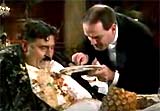
|
 |
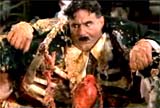
|
- the scene in Part VII: Death, of Arthur Jarrett
(Graham Chapman) as a criminal who was given the choice of "the
manner of his own execution" - the governor explained Jarrett's
crime - at his beachside grave: ("Arthur Charles Herbert
Runcie MacAdam Jarrett, you have been convicted by twelve good
persons and true of the crime of first degree making of gratuitous,
sexist jokes in a moving picture"); Jarrett selected a mad
dash-pursuit by a group of beautiful bare-chested women (with
brightly colored crash helmets and kneepads matching their thong-bikini
bottoms) who (with frequent panting) chased him off a cliff to
his death; he plummeted into his own gravesite where a funeral
ceremony for his death was already being held, and the priest
intoned:
"Ashes to ashes, dust to dust"
Mad Dash Over Cliff by
Bare-Breasted Females After Condemned Man Arthur Jarrett
|
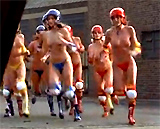
|
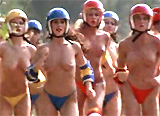
|
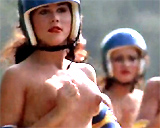
|
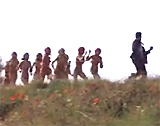
|

|

|
- the bizarre "Christmas in Heaven" segment
("It's Christmas every day in Heaven") with Santa Claus-dressed
angels wearing plastic breasts in a Las Vegas-styled hotel, with
look-alike lounge singer Tony Bennett (Graham Chapman) singing
the lyrics: ("It's Christmas in Heaven. All the children
sing. It's Christmas in Heaven. Hark. Hark. Those church bells
ring. It's Christmas in Heaven. The snow falls from the sky,
But it's nice and warm, and everyone Looks smart and wears a
tie. It's Christmas in Heaven. There's great films on TV: 'The
Sound of Music' twice an hour And 'Jaws' One, Two, and Three")
- and "The End of the Film" in which
a Queen Elizabeth-look-alike Lady Presenter (Michael Palin) spoke
to the audience: ("...here are some completely gratuitous
pictures of penises to annoy the censors and to hopefully spark
some sort of controversy, which, it seems, is the only way, these
days, to get the jaded, video-sated public off their f--king
arses and back in the sodding cinema")
|

Human-Headed Fish in Aquarium Contemplating Life

Hospital 'Miracle of Birth' Scene While Neglecting Mother
and Child
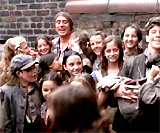
"Every Sperm is Sacred"

Protestants Bragging About Using Condoms
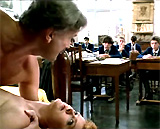
Sex Education Demonstration in Front of Class

Battlefield Goodbye Gifts

The Hand of God

Deserting the Sgt. Major and His Orders
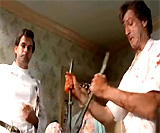
"Live Organ Transplants"
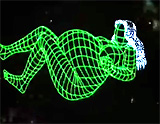
"The Galaxy Song"

The Penis Song
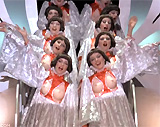
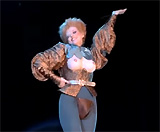
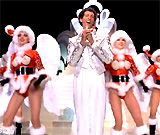
"Christmas in Heaven" Musical Segment - Santa
Claus Angels with Plastic Breasts

"The End of the Film"
|

|
Moonstruck (1987)
- the Brooklyn-Italian Castorini family: including
repressed 37 year-old Italian widow, bookkeeping accountant Loretta
Castorini (Best Actress Oscar-winner Cher), her parents: a cheating
father Cosmo (Best Supporting Actor nominee Vincent Gardenia)
and philosophical yet plain-speaking mother Rose (Best Supporting
Actress winner Olympia Dukakis), and her crusty Italian-speaking,
dog-loving Grandfather (Fiodor Chaliapin)
- Rose Castorini's growling at her father-in-law: "Old
man, you give those dogs another piece of my food and I'm gonna
kick you 'til you're dead!"
- the scene of 42 year-old, never-married, maimed
one-handed bakery operator Ronny Cammareri (Nicolas Cage) having
a steak dinner with recently-engaged Loretta (who had just accepted
a marital offer from Ronny's estranged older brother Johnny Cammareri
(Danny Aiello), a Momma's boy, but did not love him); Loretta
offered Ronny unsolicited psychoanalytical advice about his life
and why he was a tortured, isolated soul after his fiancee had
left him many years earlier: ("You can't see what you are,
and I see everything. You're a wolf....The big part of you has
no words, and, uh, it's a wolf. You know, that woman was a trap
for you. She caught you, and you couldn't get away so you chewed
off your own foot. That was the price you had to pay for your
freedom. You know, Johnny had nothing to do with it. You did
what you had to do between you and you. And now, now you're afraid
because you know the big part of you is a wolf that has the courage
to bite off its own hand to save itself from the trap of the
wrong love. That's why there's been no woman since that wrong
woman. Okay? You're scared to death of what the wolf will do
if you try and make that mistake again"); the scene ended
with a very passionate kiss between the two of them and his carrying
her to his bed for more kisses and an overnight stay
- the next morning, Loretta's immediate reaction
of regret: ("I should have taken a rock and killed myself
years ago. I'm gonna marry him. Do you hear me? Last night never
happened and I'm gonna marry him. And you and I are gonna take
this to our coffins"), and then Ronny made a proclamation
and confession of love to Loretta - followed
by two tremendous slaps across his face and the screaming of: "Snap
out of it!"
- after seeing La Boheme at the Metropolitan
Opera with her, Ronny's declaration of his cynical views on love
in a memorable romantic speech: ("...But love don't make
things nice, it ruins everything! It breaks your heart, it makes
things a mess. We, we aren't here to make things perfect. Snowflakes
are perfect, stars are perfect. Not us! Not US! We are here to
ruin ourselves and, and to break our hearts and love the wrong
people and, and DIE! I mean that the storybooks are bulls--t")
and his pleading to Loretta to come upstairs with him: ("Now
I want you to come upstairs and...and GET in my bed...")
- in the climactic breakfast proposal scene, Loretta's
angry remark when Johnny broke off their engagement and reassured
her: ("In time, you will see that this is the best thing")
and her retort back: ("In time, you'll drop dead and I'll
come to your funeral in a red dress!"); then,
when Ronny proposed to Loretta (who told her mother: "I
love him awful"), Johnny uttered a stunned reaction of "WHAT?!"
|

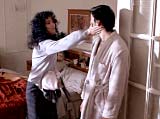

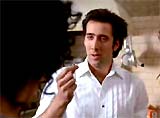
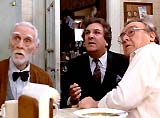
|
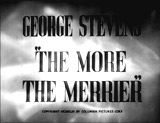
|
The
More The Merrier (1943)
- the scene of prospective elderly tenant, retired
millionaire Mr. Dingle's (Oscar-winning Charles Coburn) speaking
to the throngs of other eager tenants and pretending he was the
landlord that had already rented the apartment, and then convincing
the real landlord, young working bachelorette Connie (Jean Arthur)
to rent him half of her apartment: ("Well, look at me, I'm
neat, like a pin. Aw, let me stay...I'll tell ya what. We'll
try it out for a week. End of the week comes, if you're not happy,
we'll flip a coin to see who moves out")
- the hilarious minute-by-minute morning schedule
scene beginning at 7 am, which she presented to new roomer Dingle:
("Here's a copy of the morning schedule....Yes, it's a matter
of efficiency. You just follow this and we won't have any trouble");
she showed him the floor plan - and then went through the detailed,
systematic half-hour plan: ("Now, my alarm goes off at seven
o'clock, and we both get up. And at seven one, I enter the bathroom.
Then you go down to get the milk, and by seven five you've started
the coffee. One minute later, I leave the bathroom, and a minute
after that, you enter the bathroom. Now that's when I'm starting
to dress. Three minutes later, I'm having my coffee, and a minute
after that at seven twelve, you leave the bathroom. At seven
thirteen, I put on my eggs, and I leave to finish dressing. Then
you put on your shoes, and take off my eggs at seven sixteen.
At seven seventeen, you start to shave. At seven eighteen, I
eat my eggs, and at seven twenty-one, I'm in the bathroom fixing
my hair, and at seven twenty-four, you're in the kitchen putting
on your eggs. At seven twenty-five, you make your bed. Seven
twenty-six, I make my bed. And then while you're eating your
eggs, I take out the papers and cans. At seven twenty-nine, you're
washing the dishes, and at seven thirty, we're all finished.
You see? It's really very simple"); at the end of Connie's
long schedule description, Dingle simply asked: "Do we
do all this railroad time or Eastern war time?"
- Connie's double-take upon noticing another apartment
roommate Sgt. Joe Carter (Joel McCrea) - who was living in half
of Dingle's sub-let space for a few days before deployment
- the scenes of Mr. Dingle's attempts to play matchmaking
Cupid to bring his fellow housemates together, rather than have
Connie marry rich and stuffed-shirt bureaucrat-boss Charles J.
Pendergast (Richard Gaines) (aka "Mr. Smug") for security's
sake
- the sexually-exciting apartment front steps kissing
scene on a summer night between Connie and Joe when she bragged
about her upcoming marriage: ("I consider myself a very
lucky little lady...being engaged to Mr. Pendergast"), as
he amorously embraced her, caressed her, and fondly touched her
hands, arms, and shoulders; she vainly attempted to ignore his
advances, and held out her engagement ring for his approval;
he responded by kissing her wrist, causing her to become visibly
distracted; her voice cracked when he admired and then nuzzled
her bare neck. ("Well you see, that's the way with those
older men like Mr. Pendergast. A girl gets to appreciate their
more mature..."); Joe passionately kissed her on the lips
- and when he released, she finished the sentence: "...viewpoint";
she paused, looked away for a second, and then took the two sides
of his face with her hands and boldly kissed him back - harder,
but then, she realized that they were getting too involved -
she stood and politely stated: "I've gotta go. Good night,
Mr. Carter." He responded: "Good night, Miss Milligan"
- the subsequence scene of the couple's own version
of the "Walls of Jericho" bedroom scene (from It
Happened One Night (1934)) as they both laid in bed in
their separate adjacent bedrooms (shot from outside in a frame
split by the wall between them); they both discussed how uncomfortable
and restless they were, when Joe finally admitted: "I love
you, Connie" and she responded likewise: "I love you
more than anything in the world" - and then he abruptly
sat up and proposed
- the film's last line by Dingle -- the aging Cupid
who stage-managed the young couple's pairing, and could finally
celebrate with his favorite line: "Damn the torpedoes! Full
speed ahead!", as he put up a new name plate on the apartment
door: "Mr. and Mrs. Sgt. Carter"
|

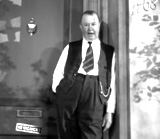
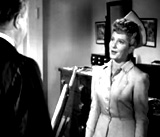



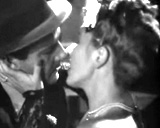
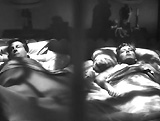
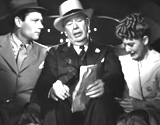
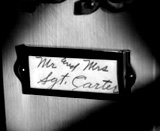
|
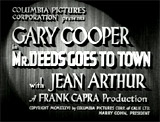
|
Mr.
Deeds Goes to Town (1936)
- the character of unassuming, eccentric bumpkin
Mr. Longfellow Deeds (Gary Cooper) from the small town of Mandrake
Falls, VT - 28 years old, a guileless, tuba-player, an unworldly
bachelor, a poet and writer of rhymes for sentimental birthday
cards, and the unexpected heir of $20 million dollars, who reacted
unbelievably: ("I wonder why he left me all that
money. I don't need it")
- Deeds' scene of departure for New York, to move
into his enormous, inherited mansion on Fifth Avenue, and the
many annoyances he encountered upon his arrival: ("The strangest
kind of people - salesmen, politicians, moochers, all want something.
I haven't had a minute to myself. Haven't seen Grant's Tomb yet")
- the scene of Deeds' meeting with the non-profit
opera board, to serve in the place of his deceased uncle who
was the chairman of the board, when he told off the snobbish
gathering that wanted him to pay the $180,000 bills: ("If
it's losing that much money, there must be something wrong. Maybe,
maybe you charge too much. Maybe you're selling bad merchandise.
Maybe a lot of things")
- the scene of reporter Louise "Babe" Bennett's
(Jean Arthur) masquerade as poverty-stricken
"Mary Dawson " in a rainstorm, when she pretended to
faint and he came to her rescue
- the second encounter between Babe and Deeds, including
a sight-seeing tour to an aquarium, a ride on the open top of
a Fifth Avenue bus, and a visit to Grant's Tomb where he patriotically
extolled America as a place where any boy could become President:
("Oh, I see a small Ohio farm boy becoming a great soldier.
I see thousands of marching men. I see General Lee with a broken
heart surrendering. And I can see the beginning of a new nation,
like Abraham Lincoln said. And I can see that Ohio boy being
inaugurated as President. Things like that can only happen in
a country like America")
- their visit to Central Park, where on a park bench,
they sang an improvised duet of "Swanee River," with "Mary" drumming
on the lid of a garbage can with two sticks,
while he made tuba-like oom-pah-pah bass sounds with his mouth:
("Way down upon the Swanee River. Far, far away...")
- the over-romantic Deeds' marriage proposal to "Mary"
- with the presentation of a sentimental poem that she read outloud
(barely audible) in a moving, emotionally-choking whisper:
("I've tramped the earth with hopeless beat, Searching
in vain for a glimpse of you. Then heaven thrust you at my
very feet, A lovely angel, too lovely to woo. My dream has
been answered, but my life's just as bleak. I'm handcuffed
and speechless, in your presence divine. For my heart longs
to cry out, if it only could speak. I love you, my angel, be
mine, be mine")
- soon after, Deeds' disgruntled discovery that "Mary" was
a deceitful, Pulitzer-Prize winning reporter, when it was revealed
in a newspaper clipping: ("She's the star reporter on the Mail! Every
time you opened your kisser, you gave her another story. She's
the dame who slapped that moniker on ya Cinderella Man! You've
been making love to a double dose of cyanide")
- Deeds' confrontation with an unemployed, outraged,
hunger-crazed farmer (John Wray): ("Did you ever think of
feeding doughnuts to human beings?") - who caused Deeds
to rethink things, to remain in New York, and to give away his
entire fortune - the newly-acquired source of all his misfortune
- to dispossessed, unemployed farmers
- the climactic lunacy hearing when Deeds was accused
of being "pixilated," and Babe urged him to testify
against the charges: ("He could never fit in with our distorted
viewpoint, because he's honest and sincere and good. If that
man's crazy, your Honor, the rest of us belong in strait-jackets");
Deeds first debunked the two nice elderly Faulkner sisters, Jane
and Amy Faulkner (Margaret Seddon and Margaret McWade), brought
there from his hometown (who declared him "pixilated");
they were unmasked as self-centered and frivolous, and neutralized
when under further questioning, they admitted: "Why, everybody in
Mandrake Falls is pixilated - except us"
- Deeds' debunking of all the silly quirks that
people have: the Judge's 'O-filling', Dr. Haller's doodling,
and his uncle's nose-twitching and his aunt's knuckle-cracking
as other examples: ("So you see, everybody does silly things
to help them think. Well, I play the tuba.")
- and then Deeds' successful defense of his philanthropy
with a speech about helping the 'underdog': ("From what
I can see, no matter what system of government we have, there
will always be leaders and always be followers. It's like the
road out in front of my house. It's on a steep hill. Every day
I watch the cars climbing up. Some go lickety-split up that hill
on high, some have to shift into second, and some sputter and
shake and slip back to the bottom again. Same cars, same gasoline,
yet some make it and some don't. And I say the fellas who can
make the hill on high should stop once in a while and help those
who can't. That's all I'm trying to do with this money. Help
the fellas who can't make the hill on high")
- the final declaration of the Judge on Deeds' insanity:
("Mr. Deeds, there has been a great deal of damaging testimony
against you. Your behavior, to say the least, has been most
strange. But, in the opinion of the court, you are not only
sane but you're the sanest man that's ever walked into this courtroom.
Case dismissed")
|
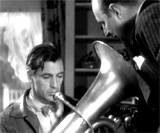
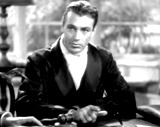
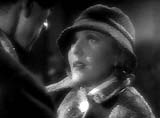
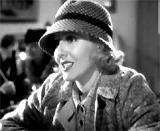
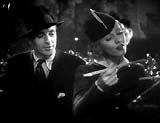
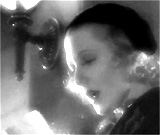
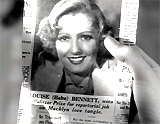

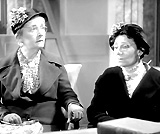
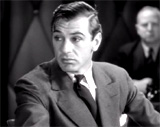

|
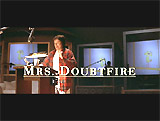
|
Mrs. Doubtfire (1993)
- the office scene between irresponsible, eccentric
voice-dubbing actor Daniel Hillard (Robin Williams) and stern-faced
social worker Mrs. Sellner (Anne Haney), when he demonstrated
his "special skills" to her: a German accent ("Well,
I do voices"), an evangelist ("Yes!"), a Martian
("We've come to this planet looking for intelligent life.
Oops, we made a mistake"), a Russian immigrant ("Happy
to be in America. Don't ask for a green card"), a Monster
("I want you in the worst way"), Groucho ("Well
this is certainly a rough meeting and it's not going very well
for me, I'll tell ya that") and Chico Marx ("Hey boss,
give her a chance. She's gonna loosen up any moment"), Sean
Connery ("Look at me right now, Moneypenny, I want to undo
that bow and get to know ya"), a used-car salesman ("I'll
be crazy to make a deal with you!"), Ronald Reagan ("Nancy
and I are still looking for the other half of my head"),
Walter Brennan ("This is it! Yes, I'm doing it! I'm sittin'
on a gold mine!"), Humphrey Bogart ("Don't make me
smack you, sweetheart. I'll do it"); and then when she didn't
seem to find him "humorous," he sat back and admitted
he wasn't funny: ("There was a time when I found myself
funny, but today you have proven me wrong. Thank you")
- following Daniel's unwanted divorce from wife
Miranda (Sally Field), his disguise as a genteel, stern British
nanny named Mrs. Euphegenia Doubtfire, in order to serve as a
housekeeper in his own house - to keep in contact with his family
during a custody trial period without his wife or three children
knowing his identity; his disguise was created by his make-up
artist brother (Harvey Fierstein) after he asked: "Could
you make me a woman?"
- the scene of Daniel's improvisation when his latex
face-mask fell out of the window and was runover by a truck in
the alleyway - he stuck his face into the top of a frosted cake
in a refrigerator to conceal his masculine face; he apologized:
("I must look like a Yeti in this getup"), and explained to
his stunned social worker (who was doing an inspection) to whom
he served English tea that it was his "nightly
meringue mask, part of my beauty regimen"
- Mrs. Doubtfire's rapid-fire "graphic" series
of words depicting sexual intercourse to Miranda's new love interest
Stu Dunmire (Pierce Brosnan), after he had given Miranda an expensive
'bauble' gift as a 'bit of a going down payment' in order to
convince her to have sex with him: "You know, dear. Sink
the sub. Hide the weasel. Park the porpoise. A bit of the old
Humpty Dumpty, Little Jack Horny, the Horizontal Mambo, hmm?...The
Bone Dancer, Rumpleforeskin, Baloney Bop, a bit of the old Cunning
Linguistics?"
- the scene of Mrs. Doubtfire cooking dinner for
the first time and setting her/his blouse and ample-bosomed chest
on fire: ("My first day as a woman, and I'm getting hot
flashes"); he finally extinguished the flaming boobs with
two pot lids
- to the tune of Aerosmith's (Dude) "Looks
Like a Lady" - Mrs. Doubtfire vacuumed the carpet while
dancing, and strummed a broom like an electric guitar
- the classic Bridges Restaurant scene in which
he frantically dashed from one table to another - for an appointment
with TV executive Jonathan Lundy (Robert Prosky) at one table
(Daniel was dressed as his alter-ego female character - the host
for his proposed new show: a "hip old granny who could hip-hop,
be-bop, dance till ya drop") and for Miranda's birthday
party at another, hosted by Stu, who choked on a piece of food
and required the Heimlich maneuver; and in the process, Mrs.
Doubtfire's ripped mask revealed his true identity
|

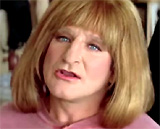
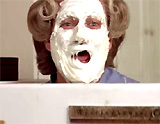
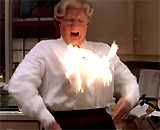
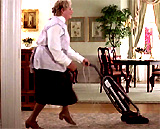
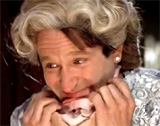
|
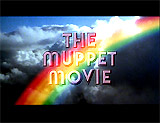
|
The Muppet Movie (1979)
- the enchanting opening (a film-within-a-film)
that told of the origins of Kermit in the swamp and the image
of Kermit strumming a banjo and singing the Oscar-nominated "The
Rainbow Connection"
- the film's deliberately cheesy puns and jokes
(i.e. turning left at the literal fork in the road)
- the astonishing puppetry featuring such tricks
as Kermit the Frog (voice of Jim Henson) riding a bicycle without
any visible means of support
- all the friendships formed between Kermit and
the other bizarre Muppet cast of characters met along the way
including the unfunny, clownish Fozzie the Bear (voice of Frank
Oz), the silly, chicken-loving Great Gonzo (voice of Dave Goelz),
and the vain, preening and explosively violent Miss Piggy (also
Oz) who carried a romantic torch for Kermit
- pianist Rowlf the Dog's (also Henson) duet with
Kermit: "I Hope That Something Better Comes Along"
- with over a dozen celebrity cameos from Hollywood's
Golden Age through to hip comedians and actors of the time, including
ventriloquist Edgar Bergen (who died shortly after his scene
was filmed and to whom the film was dedicated) and his dummy
Charlie McCarthy, and the insane German-accented Professor Max
Krassman (Mel Brooks)
- the brilliantly funny cameo by Steve Martin as
a rude, sarcastic waiter serving Miss Piggy and Kermit the Frog
on a date from a table-side ice bucket: “Sparkling Muscatel.
One of the finest wines of Idaho," costing only 95 cents,
consumed through straws, and evaluated by smelling its cap
- Gonzo's sweetly sung "I'm Going to Go Back
There Someday" while the gang was stranded in the desert
at night
- the magical conversation Kermit literally had
with himself: ("Well, then...I guess I was wrong when I
said I never promised anyone. I promised me...")
- the western-styled showdown between cowboy-costumed
Kermit and villainous Doc Hopper (Charles Durning) who threatened:
("All right, Frog, one last chance. You're gonna do my TV
commercial live or stuffed"); Kermit replied: ("Hopper,
what's the matter with you? You gotta be crazy chasin' me half-way
across the country. Why are you doing this to me?"); when
Doc Hopper expressed his desire to own a thousand frog-leg restaurants,
Kermit replied: ("I've got a dream too. But it's about singing
and dancing and making people happy. That's the kind of dream
that gets better the more people you share it with. And, well,
I've found a whole bunch of friends who have the same dream.
And, it kind of makes us like a family. You have anybody like
that, Hopper? I men, once you get all those restaurants, who're
you gonna share it with? Who are your friends, Doc? Those guys?
I got lots of friends")
- the deus ex machina ending when Animal
grew to giant size after swallowing InstaGrow pills and scared
off Doc Hopper, and Orson Welles' cameo appearance as Lew Lord,
who told his secretary (Cloris Leachman): "Miss Tracy, prepare
the standard 'rich-and-famous' contract for Kermit the Frog and
company"
- the climax when a rainbow shone through the studio
set ceiling onto the cast, while the entire Muppet group sang
a reprise of "The Rainbow Connection" ("Life's
like a movie, write your own ending, keep believing, keep pretending,
we did what we set out to do...") - interrupted when Sweetums
(voice of Richard Hunt) burst through the film into the theater
where the rest of the Muppet cast was screening the film: ("I
just KNEW I'd catch up to you guys!")
- the end credits antics of the Muppets, concluding
with Animal bursting through the "THE END" screen and
telling the audience: "Go home! Go home! Bye-bye!"
|

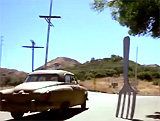
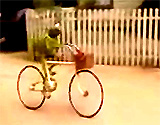
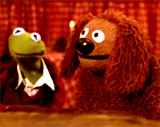
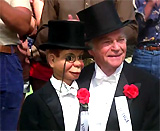
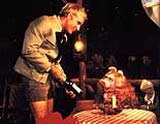
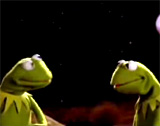

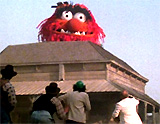

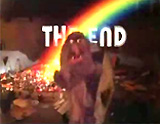
|
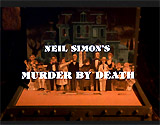
|
(Neil Simon's) Murder by Death
(1976)
- in this detective-mystery film spoof, the "instructions"
scene between the blind butler Bensonmum (Alec Guinness) and the
deaf-mute kitchen maid-cook Yetta (Nancy Walker): "Who are you?
You must be the new kitchen maid. I hope you can cook. Hmm? Answer
me. Speak up. What's that? I can't hear you. A little shy, are
you? Never mind. There will be 10 for dinner. Here is the menu.
(She held up a printed note: ALSO I CANNOT READ ENGLISH. THIS NOTE
WAS WRITTEN FOR ME) Is that understood? And dinner will
be at 9:00. When I want you, that bell on the wall will ring three
times. All right. Get to work"
|

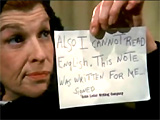
|
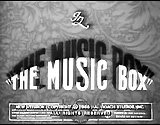
|
The Music Box (1932) (short)
- the scenes of Transfer Company deliverymen Stan
(Stan Laurel) and Ollie (Oliver Hardy) laboriously moving an
uncooperative crated upright piano up a steep set of stairs to
a house - purchased as a birthday gift; "the music box" continually
wanted to find its way to the bottom of the steps
- the encounters with a sassy Nursemaid (Lilyan
Irene) pushing a baby carriage who asked to pass - when the two
obliged and moved aside, the piano bounced back down the steps;
the moment of Stan's kicking of the Nursemaid's backside after
she chuckled at them insultingly ("Of all the dumb things");
and her retaliation with a punch to Stan's face - and when Ollie
laughed, the Nursemaid's smashing of a large glass baby bottle
over his head
- further encounters with an irate cop (Sam Lufkin),
an angry customer (a distinguished and pompous Professor Theodore
von Schwartzenhoffen played by Billy Gilbert) not knowing the
piano was a surprise birthday gift, and a helpful postman (Charlie
Hall) who told the two: ("You didn't have to do that. You
see that road down there?...All you had to do was to drive around
that road to the top here")
- the sequence of using a block and tackle to hoist
the piano crate into the second story window, resulting in further
disaster
|
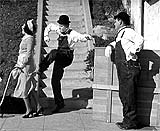
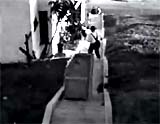

|
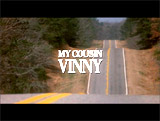
|
My Cousin Vinny (1992)
- the character of street-smart, big-haired and
black-leather-wearing fiancée Mona Lisa Tito (Marisa Tomei)
who assisted Brooklyn lawyer/boyfriend Vinny Gambini (Joe Pesci)
during a trumped-up murder charge of his cousin Bill (Ralph Macchio)
and his buddy Stan (Mitchell Whitfield) in a Wazoo, Alabama courtroom
- resided over by exasperated, unsympathetic, by-the-book trial
Judge Chamberlain Haller (Fred Gwynne)
- Mona's discussion with Vinny about his idea
to go hunting a defenseless deer with the local DA Jim Trotter
III (Lane Smith) in order to get information out of him, and
her disbelief at him: ("You're gonna shoot a deer?...A sweet,
innocent, harmless, leaf-eating, doe-eyed little deer?");
when he asked how his pants looked for the hunt, she went into
a tirade: "Imagine you're a deer. You're prancin' along.
You get thirsty. You spot a little brook. You put your little
deer lips down to the cool clear water.....BAM! A F--KIN' BULLET
RIPS OFF PART OF YOUR HEAD! YOUR BRAINS ARE LAYIN' ON THE GROUND
IN LITTLE BLOODY PIECES. Now, I ask ya. Would you give a f--k
what kind of pants the son of a bitch who shot you was wearing?"
- the scene of Mona Lisa berating stressed-out Vinny
on the outdoor porch about her ticking biological clock and delayed
marriage, after she paced back and forth: "Well, I hate
to bring it up, because I know you got enough pressure on you
already. BUT, we agreed to get married as soon as you won your
first case. Meanwhile, ten years later, my niece, the daughter
of my sister, is gettin' married! My biological clock is tickin'
like this (she tapped her foot), and the way this case is goin',
I ain't never gettin' married!...", but then after Vinny
exploded in exasperation: ("BIOLOGICAL CLOCK - my career,
your life, our marriage, and let me see, what else can we pile
on? Is there any more S--T we can pile on to the top of the outcome
of this case? Is it possible?"), she admitted: "Maybe
it was a bad time to bring it up"
- also, Vinny and Mona Lisa's conversation about
the dripping, broken sink faucet in their motel bathroom, and
her knowledgeable argument proving that she wasn't at fault: "If
you will look in the manual, you will see that this particular
model faucet requires a range of 10 to 16 foot-pounds of torque.
I routinely twist the maximum allowable torquage....Because I
used a Craftsman model 1019 Laboratory Edition Signature Series
torque wrench. The kind used by Caltech high energy physicists
and NASA engineers....Because a split second before the torque
wrench was applied to the faucet handle, it had been calibrated
by top members of the state and federal Department of Weights
and Measures to be dead on balls accurate! Here's the certificate
of validation...It's an industry term"; Vinny concluded:
"I guess the f--king thing is broken"
- in court, Vinny's mangled pronunciation of two
youths ("two utes"), and his questioning by the Judge:
("...Ah, the two what? Uh... uh, what was that word?...Two
what?...Uh... did you say 'yutes'?...What is a yute?")
- the scene of Mona Lisa's testimony on the witness
stand against the confrontational DA, and her expert knowledge
of automotive mechanics, first the term "positraction": "It's
a limited slip differential which distributes power equally to
both the right and left tires. The '64 Skylark had a regular
differential, which, anyone who's been stuck in the mud in Alabama
knows, you step on the gas, one tire spins, the other tire does
nothing," and also, her retort to the DA when she was asked: "Now,
uh, Ms. Vito, being an expert on general automotive knowledge,
can you tell me what would the correct ignition timing be on
a 1955 Bel Air Chevrolet, with a 327 cubic-inch engine and a
four-barrel carburetor?"; when she stated it was a "trick
question," she finally answered: "'Cause Chevy didn't
make a 327 in '55, the 327 didn't come out till '62. And it wasn't
offered in the Bel Air with a four-barrel carb till '64. However,
in 1964, the correct ignition timing would be four degrees before
top-dead-center"
- and in the conclusion, Mona Lisa's new attitude
about getting married to Vinny: (Vinny: "I won my first
case, you know what this means..." Mona Lisa: "Yeah,
you think I'm gonna marry you." Vinny: "What, now you're
not gonna marry me?"
Mona Lisa: "No way. You can't even win a case by yourself,
you're f--kin' useless")
|
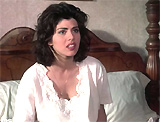
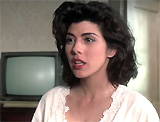
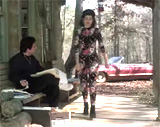
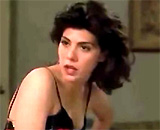
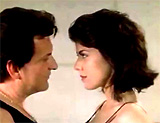
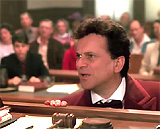
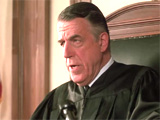
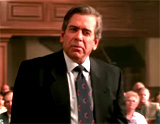
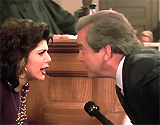
|

|
My Favorite Wife (1940)
- the honeymoon scene at Yosemite Park lodge, when
newly-married, 'widowed' lawyer Nick Arden (Cary Grant) with
his second wife-bride Bianca (Gail Patrick) entered the elevator,
and as the door closed taking them to Suite 'C', Nick caught
a surprise glimpse of his first wife Ellen (Irene Dunne), who
had disappeared (and was declared dead), but then unexpectedly
returned after being shipwrecked for seven years on an island
and was rescued by a Portuguese freighter
- the frustrations experienced by a perturbed Bianca,
who thought her erratic and strange-acting husband (full of excuses)
was purposely avoiding her on their honeymoon night, especially
when he left for a shave in the hotel's barber shop, declaring:
("Oh, I feel like a hairy ape...well, I don't feel right
unless I shave...")
- Nick's scene with the confused hotel desk clerk
when he ordered a second room, Suite 'A', for another wife -
Ellen: ("I'd like to have another room"), and the clerk's
reaction: ("What a man!")
- Ellen's tormenting of Nick and Bianca, by pretending
to be a southern friend of the family
- the revelation during a late-night visit by an
insurance officer (Hugh O'Connell) that there may have been a
second person on the island with Ellen, named Stephen Burkett
(Randolph Scott)
- Nick's tracking down of Burkett, finding him to
be a handsome, virile, athletic diver and pool swimmer at the
posh Pacific Club - and the fact that Ellen and Stephen called
themselves "Adam"
and "Eve" on the island; when Nick first spotted Burkett
on the diving board, a woman came up to him and asked: ("Is
that Johnny Weissmuller?"), and Nick jealously replied: ("No,
I wish it were")
- the scene of Ellen unsuccessfully trying to fool
Nick by recruiting a mousey shoe salesman (Chester Clute) to
claim that he was "Adam" while they were on the island
- the courtroom scenes, after Nick was arrested
for bigamy, with befuddled Judge Bryson (Granville Bates), who
had already declared Ellen legally dead, annulled the first marriage,
and approved the second marriage; he noted to the two paired
couples: ("I'd like to tell my wife about this case. She
thinks all my cases are dull")
- the final reconciliation scene in a mountain cabin
between Nick and Ellen when he dressed up as Santa Claus to join
her in her bedroom rather than sleep separately in the attic
|
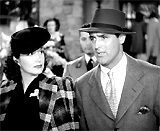
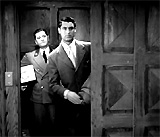
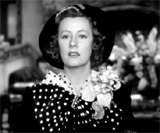
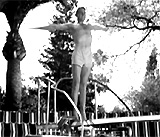
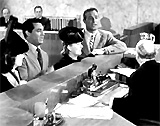
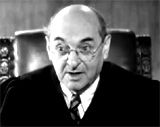
|

|
My Favorite Year (1982)
- a bittersweet comedy about flamboyant, Errol Flynn-like
alcoholic British film actor Alan Swann (Peter O'Toole) - the
guest star for a live 50's variety TV program named The King
Kaiser Show during one week in the fall of 1954
- the many scenes of his alcoholic misadventures
- stumbling and flipping onto a table while his film was being
projected on a screen, falling face first, being strapped onto
his luggage and humming: "The 1812 Overture" while
being dragged up the stairs, etc. while the show's fledgling
writer Benjy Stone (Mark Linn-Baker) (the film's narrator) was
helplessly assigned to keep Swann out of trouble during the week
- the rooftop scene of Swann climbing down the side
of a building attached to a long fire hose
- the character of the show's burly and despotic
star Stan "King" Kaiser (Joseph Bologna) with his
escalating feud against equally tough, monosyllabic, corrupt
Mafia don and union boss Karl Rojeck (Cameron Mitchell) whom
Kaiser ruthlessly satirized in his sketches - and the scene of
their discussion about
"the removal business" (tossing each other's precious
items out the building window)
- the character of the writer's exuberant Jewish
mother Belle Carroca (Lanie Kazan), married to Filipino ex-boxer
Rookie Carroca (Ramon Sison)
- with memorable lines of dialogue such as: (Benjy
Stone: "I think I'm going to be unwell"
Alan Swann: "Ladies are unwell, Stone. Gentlemen vomit";
or Sy Benson: "He's plastered!" Swann: "So are some
of the finest erections in Europe")
- Swann's response to crusty wardrobe lady Lil's
(Selma Diamond) admonition in the women's restroom: "This
is for ladies only!" - Swann nonchalantly unzipped his fly
and retorted:
"So is THIS, madam, but every now and then I must run a little
water through it!"
- Swann's drunken, screeching stage fright when
discovering that the TV show was live and in front of an audience: "You
mean it all goes into the camera lens and then just spills out
in people's houses?...Audience, what audience? Audience?... I
haven't performed in front of an audience for 28 years! Audience?
I played a butler. I had one line! I forgot it....I'm not an
actor, I'm a MOVIE STAR!"
- in the conclusion, swashbuckling Swann's saving
of the day during a live broadcast after a fight broke out onstage,
when he swung onto the stage on a rope, dressed as a 'musketeer',
and saved Stan Kaiser from being beat up by thugs sent from Rojeck
|
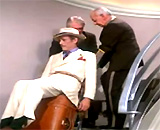
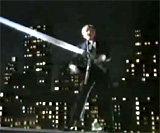
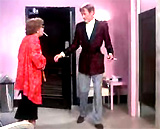
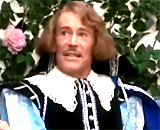
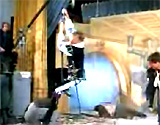
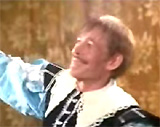
|
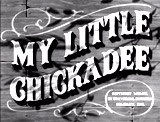
|
My Little Chickadee (1940)
- the few classic scenes between
Flower Belle Lee (Mae West) and con-man/husband of convenience
Cuthbert J. Twillie (W. C. Fields) in their only film together,
and his best lines:
(1) when told that there was nothing good about Flower Belle by
prudish Mrs. Gideon (Margaret Hamilton), he responded: "I
can see what's good. Tell me the rest"
(2) holding and kissing her hand on the train, he exclaimed:
"What symmetrical digits!"
(3) and Twillie's proposal of marriage: "Will you take me?" and
Flower Belle's reply as she rolled her eyes: "I'll take you,
and how" - and the scene of their phony sham marriage aboard
the train
- also Flower Belle's assurance that she would
be a good (unlikely) schoolmarm teaching math: "I was always
good at figures"
- also her famous line to two suitors: "Any
time you got nothin' to do and lots of time to do it, come up"
- and Twillie's last line to Flower Belle as he
left town to attend to his "hair" oil wells: "...you
must come up and see me sometime" and the camera's last
image -- Flower Belle sashaying her bottom as she ascended the
stairs
|
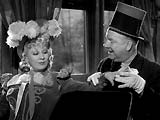
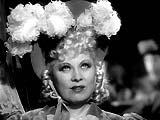
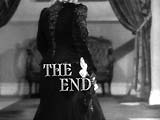
|
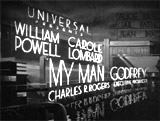
|
My
Man Godfrey (1936)
- the set-up to the film: spoiled socialite Irene
Bullock's (Carole Lombard) discovery of "forgotten man" Godfrey
"Smith" Parke (William Powell) at the city dump during
a scavenger hunt, and her subsequent hiring of him to be her family's
butler, in the home of the Bullocks: Alexander (Eugene Pallette)
and ditsy wife Angelica (Alice Brady)
- the famous scene of Angelica's protege Carlo (Mischa
Auer) performing a gorilla imitation to cheer up Irene; he hunched
over, ambling and loping around the living room, and jumping
up and over the furniture and onto the window frame; Irene's
phony fear reaction to his ape mimickry (""He frightens
me"), while Alexander joked: ("Why don't you stop imitating
a gorilla and imitate a man?...Someday I'm going gorilla-hunting
and I won't miss"); and slightly earlier, Carlo's lamenting
moan about financial ruin: ("Oh, Money, money, money! The
Frankenstein Monster that destroys souls")
- the bathroom scene in which Godfrey tossed Irene,
when she faked swooning, under the cold water of a shower fully
clothed, and she replied receptively: ("Oh, Godfrey, now
I know you love me"); when he rejected her statement: ("I
do not love you and you're getting me all wet"); Irene continued:
("You do or you wouldn't have lost your temper")
- the final sequence, after Godfrey resigned from
the wacky family and was running a luxurious and fashionable
nightclub, aptly named "The Dump"; Irene trailed after
him and vowed her love: ("You love me and you know it. You
know, there's no sense in struggling against a thing when it's
got you. It's got you and that's all there is to it. It's got
you!"); she talked him into instantly getting married in
a civil ritual with a judge, and tried to be reassuring: ("It
may get me into a lot of trouble, but, uh, I guess I've known
your family long enough to take a chance") - and then she
spoke the final lines of the film before the ceremony: ("Stand
still, Godfrey, it'll all be over in a minute")
|
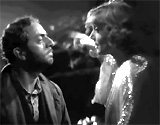
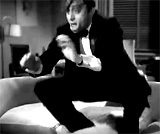
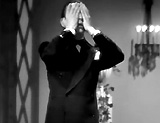
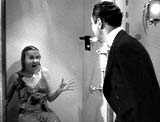

|
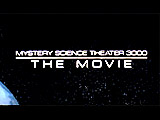
|
Mystery Science Theater 3000:
The Movie (1996)
- the hundreds of witty one-liners
shouted back at the sci-fi classic This Island Earth (1955) by
Mike Nelson (Himself), Tom Servo (voice of Kevin Murphy) and
Crow (voice of Trace Beaulieu), with such lines as: "This
Island Earth can be yours if the price is right!" - "This
isn't shot day-for-night. It's more like 4:30-for-5:15",
and "What kind of shit-hole planet is this?"
|
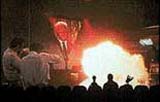
|












































































































